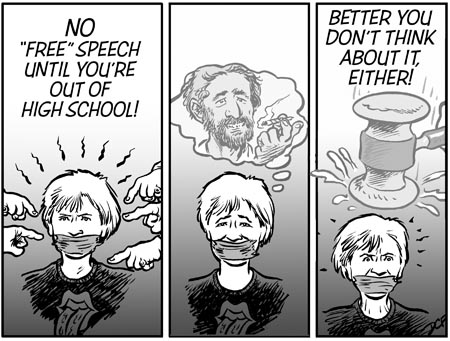School Speech, The Prequel November 25, 2011
Many people, particularly students, use blogs and social networking as platforms for ranting. Though the First Amendment does protect “free speech,” it is important to note the limits of its protections. With regards to school speech, there are four court cases that have paved the way for current rulings: Tinker, Fraser, Hazelwood, and Morse.
A brief synopsis of the “Big Four” school speech cases:
- Tinker v. Des Moines Independent Community School District (1969): Teenage students wore black armbands to protest Vietnam War. (Understand that this staged during a very tense and political time) The court ruling basically stated that students do not lose their rights upon entering the schoolhouse gates but did include a caveat that it is plausible for students to have rights stripped if they caused “substantial disruption.” Nonetheless, general fears were not enough to justify the stifling of student speech, so for this specific case the armbands were NOT substantial disruption.
- Bethel School District v. Fraser (1986) : This case was concerning inappropriate speech at school assembly. Fraser had made a sexually suggestive speech during a school assembly, which resulted in disciplinary action. So the question arose, if speech is lewd, vulgar, obscene but does not cause disruption, can schools still control said speech? (Of course, defining obscenity is a whole other can of worms.) The Supreme Court sided with the school, agreeing with Fraser’s suspension, saying that a school’s mission is to teach civics and foster good citizens; Fraser’s inappropriate speech clearly conflicted with this mission, thus establishing a boundary to the scope of Tinker.
- Hazelwood School District v. Kuhlmeier (1988) : A student wrote a school newspaper article about teen pregnancy, and the article was yanked from school-sponsored paper. Does this qualify as political speech and can the school act as a censor? The court ruled that as it was a school-sponsored paper, the school did have editorial control. Whatever was printed in the paper reflected the ideals the school promoted and if the articles conflicted with the schools pedagogical mission, the administrators had free rein to censor.
- Morse v. Frederick (2007): If you are thinking about hoisting a “Bong Hits 4 Jesus” banner across the street from school during a school event, better think twice. High school student, Frederick, was suspended for this action. The Court ruled that suspension did not violate Frederick’s First Amendment rights because the speech occurred at a school-sponsored event and the speech promoted illicit drug use, which contradicted the school’s mission. However, if this was not during a school event, say if he was at a marijuana legalization rally, this would not have been punishable.

Illustration by Doug Potter
In most contexts, the law protects such political speech in school. However, recent court cases (in other words, the major cases post-Tinker) have attempted to curtail the free speech rights of students. Of course, this leads to a very legitimate debate regarding the role of schools in regulating society’s morals. Do we really want schools condoning the use of foul language? Do we really want our children to enter an institution that sponsors sex, drugs, and debauchery? Or do we want students to figure out their views completely on their own? Do we want students to have the ability to say whatever they themselves deem fit?
You might be scratching your head, wasn’t this blog called CYBERitas? Where does the Internet come into play? Don’t worry I’ll get there in my next post — stay tuned!